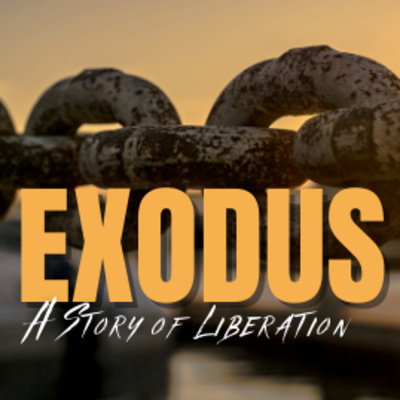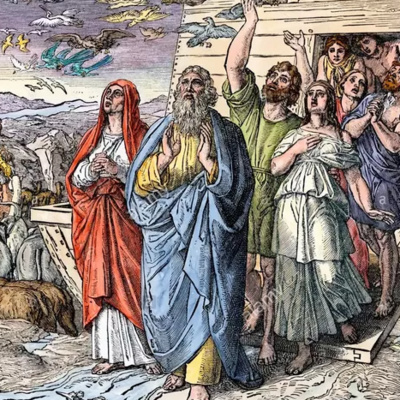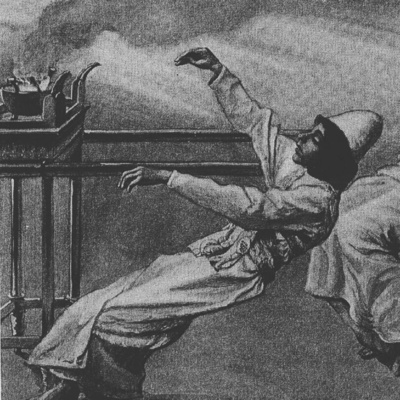
Reb Josh's Torah
By Joshua Schwartz

Reb Josh's TorahFeb 15, 2022

Making Teachers & Finding Friends: A Life of Learning (Pirkei Avot 11)
"Make for yourself a teacher, acquire for yourself a friend." (Pirkei Avot 1:6)
Well, we've come to the end of our regular, weekly classes. We took 2+ years of disruption and filled them with instruction (forgive me).
Our last class focuses on how we can take our learning into our own hands, by seeking out the supports we need to walk that path. How can we find teachers in our lives and make friendships of mutual support, so we're not going it alone?
Tune in to find out
Here's a link to the source sheet: https://www.sefaria.org/sheets/419829?lang=bi

Making Room to Learn: The Teacher/Student Dynamic
We look at a selection from Pirkei Avot's 48 ways to learn Torah and delve into the nature of the teacher / student relationship. We discover how, in the ideal situation, there is room made for the student to contribute, question, even to critique. This topic sets us up as this series comes to a close, as we ask ourselves how we can steward our own learning in the future.
If you want to check out the source sheet (in this class, we worked on Pirkei Avot 6:6), you can click here: https://www.sefaria.org/sheets/419829.2?lang=bi&with=all&lang2=en

What We Owe to Others, Or: How Not to Be a Sodomite (Pirkei Avot 9)
Pirkei Avot lists four ways of being in the world, and believing that "what is mine is mine, and what is yours is yours" is seen as either being an intermediate position or... the character of the wicked city of Sodom.
Once we dig into what kind of society Sodom had, we see that maintaining that hands-off attitude ends up eventuating into force, violence, and cruelty. Is there a way we can keep from such a devolution? Can we reprogram how we see ourselves in relation to others?

Turn It Over, Turn It Over: Effort & Diligence on the Way to Wisdom (Pirkei Avot #7)
"Turn it over and turn it over, for all is in it." These are the stirring words of Ben Bag Bag, indicating that the task of Torah is an immense one. Torah itself is vast, containing "all," but so, then, is our relation to it, which demands our deep commitment, our persistence, and our consistence. A kind of resilience is asked of us, for the path of Torah (or of life) is not always easy, but, then again, "according to the struggle is the reward."
The source-sheet can be found here, so you an learn along at home: https://www.sefaria.org/sheets/416222.4?lang=bi&with=all&lang2=en

The Work Is Great but the Day Is Short: Rabbi Tarfon's Tips to Avoiding Burnout (Pirkei Avot #6)
Last class, we looked at how Pirkei Avot called on us to see our efforts and our labour as potential sources of spiritual value. But if everything is transcendent & meaningful, then it's quite easy to become obsessed, lose balance, and eventually burnout.
How can we stay committed when the task at hand is so great? Tune in to find out!
Here is a link to the source sheet, so you can learn along at home: https://www.sefaria.org/sheets/413834.8?lang=bi&with=all&lang2=en

Holy Labour: Pirkei Avot's Theology of Work, pt. 1
We're just now recovering from the peak experience of receiving the Torah once more at Har Sinai over Shavuot. However, how can we bring what we have received and learned into our normal, workaday lives? How can we find the sacred within our toil?
Shemayah calls for us to love work (and hate our boss); how can we recover the holiness of our labour & resist its reduction to being a mere job? Tune in to find out!
Here is a link to the source-sheet. In this class, we covered the material on Pirkei Avot 1:10. Next week, we'll look at 2:15-16 www.sefaria.org/sheets/413834

For Its Own Sake: What a Life of Torah Entails (Pirkei Avot #4)
Shavu'ot approaches, when we receive the Divine gift of Torah once more. In this class, we inquire into what it means to accept on oneself that gift and how it shapes our lives. What does it mean to commit oneself to a life of Torah? How does it inform and transform your life?
Tune in to find out!
You can learn along at home with the source-sheet here: https://www.sefaria.org/sheets/409746?lang=bi
Zoom kept crashing on me, so there are a few interruptions (tho' thematic), and the audio quality is suboptimal. Apologies.

Terms of Service - Commitment & Conditions (Pirkei Avot #3)
We often think of ourselves as "servants of G-d," but how far does that metaphor go? Antigonos of Socho warns us not to be in it for compensation. But: is that a reasonable way to live life? How do we include our needs in our service?
Tune in to find out!
Here's the source-sheet, so you can learn along at home: www.sefaria.org/sheets/406468

These Three Things: The Foundations of the World (Pirkei Avot #2)
We usually associate groups of three with a different religion, but Pirkei Avot presents us with two different teachings about the three things upon which the world stands:
- Torah - Din
- Avodah - Emet
- Gemilut Hasadim - Shalom
What do each of the items have to do with each other with their respective groupings, and are the two triads related, or do they stand alone? Tune in to find out!

Time of Our Liberation: What Passover Teaches Us about Freedom
Freedom is a concept bandied about so much nowadays, but it mostly has to be with being freed *from* something: oppression, regulation, responsibility. Of course, liberation requires being free of the forces that demean you, but it's a thin conception of freedom that sees its end-goal as being rid of any and all expectations. It's a child's notion of freedom.
Passover presents us with a more complex and more robust notion of freedom, in which our liberation from slavery freed us to commit ourselves to that which is actually worthy of that infinite gift: the free self. It's a freedom that comes along with responsibility, to ensure that all around us can experience the gift of, the right to, freedom itself.
Chag Sameach!

The Need to Feed: Heter Mechirah & the Politics of Food
Once our relation to the Land changed, after the destruction of the Temple and the advent of the Exile, our Halachic obligations to the Land changed as well. But once Jews have not only resettled within Israel but also taken political control, does that mean that the Biblical laws of the Land have reactivated... including Shemitah?
To ensure that Jewish-owned fields did not fall into disorder, some prominent rabbis endorsed the Heter Mechirah, which facilitated the temporary sale of fields to non-Jewish owners. Other rabbis saw it as an inappropriate work-around and opposed the legal innovation.
In this class, we explore the justification for the Heter Mechirah and ask whether it's a capitulation and surrender of Shemitah, or, like Prozbul, is it a way to reapply the ideals of Shemitah in our very real world?

Prozbul: Legal Fiction or Moral Fact?
In the Mishnah, it is reported that Hillel instituted the "Prozbul" for the sake of Tikkun Olam, to keep the world going. What is the Prozbul? It's a way for the court to take over a debt so it is not canceled when the Shemitah arrives.
Is this some kind of technical workaround, what scholars call a legal fiction, to evade the strictures of the Sabbatical year, or, in a surprising way, was Hillel actually trying to preserve the ideals of the Shemitah within the conditions of the real world?
Tune in to find out!

Ve-Nahavoch Hu! Purim & the Topsy Turvy
At the climax of Megillat Esther, everything that was supposed to happen... didn't! Haman was supposed to be honoured, but it was Mordechai who got the parade. Esther took a bold risk & revealed herself to be a proud Jew. The Jews were supposed to be killed, but we emerged triumphant.
Purim is a day of reversed polarities, of radical reversals. What does such a topsy turvy day mean?

Liberation & Jubilation: On the Yovel
Shemitah is the culmination of the seven year cycle, and the Yovel is Shemitah squared! 7 times 7 plus one... imagine the catharsis, imagine the release. "Proclaim liberation throughout the land!"
While in Shemitah, agricultural work ceases and all debts are canceled, in Yovel, all relations of human bondage are ended and all the ways we think we can own the earth or another human being are shown to be, ultimately, fictional.

Sabbatical: On Shemitah & Shabbat
The Torah refers to both the Sabbath and the Sabbatical year as a "Shabbat Lashem," a Sabbath for G-d. How do Shabbat and Shemitah interrelate? What can we learn, one from another? And, if they are both "Sabbath[s] for G-d," in what ways can we access the Divine on and through them?
Tune in to find out!

A Happy Heart Is Always Feasting: on Purim Katan
(Normal) Purim is defined by our reading the Megillah, giving out gift baskets, praising G-d for miracle, but when it comes to Purim Katan, the pre-Purim Purim of the leap year, the Rabbis cannot seem to get it together. What do we do, and what does it mean? It seems like it's just another day... but is that actually its secret? And does that teach us something powerful about Torah, obligation, and celebration? Tune in to find out!

Harmony between Creation & Creature: Intro to Shemitah 2 of 2
Last session, we focused on what most people think of when they think of Shemitah: letting the earth rest. But Shemitah also entails a radical revolution of the economic sphere as well! How does Shemitah intervention into the credit economy change our society? Can Shemitah help us relearn how all economic relations are, at heart, human relations?
Tune in to find out!

The Earth's Rest, the Rest of Us (Intro to Shemitah, 1 of 2)
At the climax of a seven year cycle, we are commanded to allow the earth to rest. It's a tall order, a utopian vision. So, we must ask ourselves: what is this drastic intervention in normal economic and social life meant to accomplish? Another way of putting that is: how are we supposed to be left when we begin the next sabbatical cycle?
Tune in to find out...

On Tu Bishvat: From Its Roots to Its Fruits (The Earth is the Lord's #3)
Tu Bishvat is the new year for the trees, which currently serves as a kind of Jewish arbor day. But how did it transform from a fiscal marker of how to account for your orchard & its produce to become a mystical communion with majesty of G-d's grove? Was it a radical adaptation, or did the Kabbalists hone in on something that was already tucked away amidst it roots?
Tune in to find out!

The Earth Is the Lord's 2: Serving G-d & Conserving Creation
In this second session of Beth Lida's new series on Judaism & the environment, we look to Halachah. After recognizing the theological significance of our being creatures in a created world, we ask what responsibilities such a realization entails?
The class focuses on the mitzvah of Bal Tashchit (do not destroy), and we trace its development from being a regulation forbidding a kind of total war into being the regulation of our use of natural resources. Finally, we attempt a kind of rehabilitation to develop a more robust account of Bal Tashchit, one that serves the very precarious moment in which we live.

The Earth Is the Lord's 1: Creation / Theology
In this new series, we will explore what Torah has to say about creation, the environment, and our relationship to it. Judaism is rightly identified as an anthropocentric religion, as special place is made for the human being in the scheme of creation. But we have forgotten the privilege and responsibility that comes with that central role, vis a vis the rest of creation. We have forgotten that we, too, are creatures. This class focuses on the major principles that help to define what a Jewish ecology can look like.

Light in/and the Darkness: Hanukkah and the Imperative to Hope
Hanukkah is called the Festival of Lights, but it always occurs in the deepest, darkest time of the year. Why is that? Does the light defeat the dark, or is there something more complex occurring? Tune in to find out!

Joseph & Hanukkah - Deep in the Dark (Parshat Vayeshev)
Why is it that the Joseph story always coincides with the advent of Hanukkah? The hero of Hanukkah is a triumphant soldier, but the Torah protagonist is thrown in a dungeon time and time again... what's up with that? Tune in to find out!

Mother of a New World: On Noah's Wife
"A good name is better than fragrant oil," says the book of Proverbs, so why does Noah's wife, the second Eve, mother of a new world, go unnamed in the Torah?
In this class, we explore a number of ancient attempts (and some medieval and modern as well) to redress this missing mrs. What can we learn from such an attempt to recover what's been lost and to bring to the fore what's been left aside? Tune in to find out!

Avodah: The Work of Change (Yom Kippur 5782)
The Avodah service, perhaps the most obscure bit of the Yom Kippur liturgy, is caught in a bind. On one hand, it describes the climax of the holiest day of the year, the Temple ritual in which our sins are carried away; but on the other hand, it mourns the absence of the Temple and the High Priest, who effected that spiritual catharsis.
Are we left in the shadow of a lost golden age, or are we still able to access the miracle of forgiveness, in which we are loosed from what has bound us?
Tune in to discover.

Resounding in the Heavens: How the Shofar Affects G-d (2 of 2)
Last week, we focused on the way the Shofar impacts (or is supposed to impact) us, but if we know anything about sound-waves, it's that they resonate and emanate outwards... and the Shofar's sound reaches all the way to heaven.
In this Shi'ur, we will look at the way the Shofar's blasts reach G-d, how they influence what occurs in the heavenly court, and what G-d needs from us to actualize what Rosh Hashanah is supposed to be.
Here is a link to the source-sheet, if you want to learn along at home: https://www.sefaria.org/sheets/344514?lang=bi

Moved by the Sound (On the Shofar #1)
The Mitzvah of the Shofar is not on the one who blows it, but on the one who hears it. So, the essence of the Mitzvah is in the experience of the Shofar's being heard. What is supposed to happen to us when we hear this sound? What is the Shofar trying to achieve? Tune in to find out!

Speak to the Heart - G-d as a Comfort (Nachamu, Prophets #6)
After Tisha b'Av, we were left in utter despair. "Bitterly [we] wept in the night; there was none to comfort [us.]" (Lam. 1:2) How can it be that the Shabbat that follows Tisha b'Av is called Nachamu, which initiates seven whole weeks of Haftorahs of comfort? This prophecy (Is. 40:1-26) comes to show us that despite what one experiences, what one thinks one deserves, the love of G-d is not altered. Comfort is found after loss, and redemption will still come, not because we have earned it, as love is never earned. It is offered.

A Vision of How Things Should Be - Haftarat Shabbat Chazon
You'd think the Haftorah for the Shabbat before Tisha b'Av would be, like the last two weeks, from Jeremiah, our poet laureate of disaster. But it's not. Like the upcoming Haftorahs of comfort, this reading is from Isaiah. Is there some sliver of light tucked within the deepest darkness? Tune in to find out!

Listen, Wont You! - Where Did Things Go Wrong? (Three Weeks #2)
"Hear the words of G-d!"
This is the clarion call that begins the second Haftorah of the Three Weeks. G-d demands Israel start to listen agin, as a practice of attention, to pay attention not only to what the prophet speaks, but also to look inward and to take their own lives' seriously.
Can we start to listen as well?

3 - To Uproot and Pull Down - The Words of Jeremiah (Three Weeks #1)
Starting after 17 Tammuz and through the end of the Jewish year, the Haftorahs will no longer map to the parashah, but are rather responsive to the calendar, to the sweep of time. The Three Weeks between 17 Tammuz and 9 Av are a time of intensification of remembering what it is we lost. The Haftorahs in this period place us in that moment, on the cusp of disaster. We're faced with the question: what would we do? Can we take these words in, in this moment?

The Most Moved Mover: A Theology of Pathos as found in the Prophets (Nevi'im #2)
The philosophers (*cough* Rambam *cough*) despicted G-d as transcendent and unchanging, citing Aristotle's description of G-d as "the Unmoved Mover," but that is assuredly not the G-d of the Bible, especially when we look to the Prophets.
In this class, we draw on the analysis of Abraham Joshua Heschel, who saw in the prophetic writings (and indeed in the phenomenon of propehcy itself) evidence of a G-d Who cared deeply, Who was passionately invested in human affairs. This is a G-d Who takes things personally, responding from a place of personal investment and implication. This G-d is not pristine and untouched, but was affected constantly by human actions and wellbeing.
In this class, we explore G-d as the most Moved Mover.

Prophet Motive: Emissary or Adversary? (Nevi'im #1)
The classic model of a prophet is passive, basically G-d's speakerbox. G-d puts words in their mouth, and they say them. But is that truly the case, or is the reality more complex?
In this class, we look at a range of different models of the prophet, ranging from the emissary of G-d's wisdom and judgment, to a more confrontational model, interceding on behalf of the people, even *against* G-d. What could ever justify that? Tune in to find out!

A Great Voice that Did (Not) Continue - Where Are We Left after Shavuot?
The holiday of Shavuot is a climax of sorts. It's the final holiday in the series of the three Chagim. It's the culmination of the counting of the Omer, bringing us from the liberation of Pesach to revelation on Shavuot. But after the holiday ends, that is, after we receive the Torah, where are we left? Is revelation something that happened long ago, or does it resonate beyond that one moment in space-time? Can we maintain Sinai as a singular experience but still keep Torah alive in our time? Tune in to find out!

Sefirot ha-Omer: Malchut, or Made Manifest
Well, we've reached the End of the road. The Sefirot are organized in a constellation of 32 paths of wisdom, and Malchut is the terminus, the last stop on the line. It's especially fitting, as we have talked these past few weeks on how to look at aspects of ourselves differently, how to work on ourselves, but now the rubber hits the road: How do we manifest the changes we want to make?
Malchut is the Sefirah of actualization, the concretization of the potential that empties out into the created cosmos. How can we tap into this Sefirah to help bring the changes we want to make into our selves and into the world?
Tune in to find out!

Sefirot ha-Omer: Yesod - Still, Moving (Week 6)
Yesod is the Sefirah that receives all the life-force and flowing energy that stems from the source, and channels it into existence, transforming it from potential to actual. In this week, we turn that all-inclusive collection towards our soul, gathering in every part of ourselves, to be devoted to the world G-d has made, to create transformation through our own manifestation.

Lag b'Omer: Re/Union
Lag b'Omer is a mysterious and mystical holiday, with many disparate parts. Rabbi Akiba's plagued students, the death of Rashbi, the Zohar... how do they all fit together? Or... is Lag b'Omer actually about how different things come together, to form something more generative and beautiful than they could be apart?
Joshua and the whole Beth Lida community wish Nechamah and Chizuk to all those impacted and mourning the tragedy in Meron. Hashem Yerachem, and may we find the healing to which Rashbi and R' Akiba committed their lives. Amen.

Sefirot ha-Omer: Hod (week 5)
The fifth week of the Omer is the week of Hod, dignity. With Netzach, it is associated with the active, physical world. And yet, Hod is associated with peace, quietude. How can we manifest our inner peace, and bring peace to the world, without shrinking away from it? Can we pursue peace without losing it ourselves? Tune in to find out!

What Does It Mean to Be Holy? (Acharei Mot/Kedoshim 5781)
Holiness is central to whatever distinguishes a religion from other systems of meaning. In philosophy or ethics, the objective is not holiness. But when it comes to religion, it's a core concept. But... what does it mean? Is it unexplainable, undefinable, recursive? Can we dig into this basic but baffling concept and figure it out in time for this week's parshah? Tune in to find out!

Sefirot ha-Omer: Netzach (week 4)
Netzach is the Sefirah associated with the fourth week of the Omer, and it embodies the spirit of victory. In this class, we look at the complexity of winning, how it is not just a one-and-done, but is rather comprised of steps, of choices, of a whole life of effort. While there are moments of catharsis, Netzach embodies the ever-renewed struggle that comprises life, the endurance of an unbroken spirit, the victory of the broken heart.

Sefirot ha-Omer: Tiferet
The first session in a new series on the Sefirah of the week! This week, we look at the Sefirah associated with the 3rd week of the Omer, Tiferet. It is translated as beauty but seems to refer more to harmony, as the balance between left and right, law and love, judgment and mercy. How can limitation make space for giving? How can generosity manifest in restraint? Tune in to find out!

Offering a Strange Fire - Merciless Punishment or Mystical Ecstasy? (Parshat Shemini)
This week's Parshah, Shemini, begins with a surprising (and shocking!) tale, in the midst of all the sacrificial minutia: the tragic death of Nadab and Abihu, Aaron's eldest sons. Was this a punishment for their offering a "strange fire," or was their death the consequence of mystical ecstasy? What can we learn from this story? Tune in to find out!

Searching for Chametz, Inside & Out
Preparing for Pesach is enough to drive a person mad, but can we reframe our relation to searching for Chametz to be about more than housekeeping? How can we see it a a practice of attention? Is there something Divine in the drudgery? Tune in to find out!

Continuing the Beginning: Further on Hakdamat ha-Zohar (ep. 4)
"Lift up your eyes to the heavens and see Who created These" We open the mystery and explore the origin of questions, as we extend our inquiries into the cosmos, and the world reaches back out to us. And we experience the simultaneity of Zoharic language, resonating on many frequences at once.
This is the last recorded class, as the next will be only for IRL attendees. Please check out bethlida.ca for info on the last session, next Tuesday at 7:30pm. Ta chazei!

In The(se) Beginning(s): The Zohar Introduces Itself (3 of 5)
We begin by familiarizing ourselves with what the Zohar is actually made of. And once we've introduced ourselves to the text, we allow the text to introduce itself to us. We really see the hyper-referential creativity that comprises the Zohar's style. Let's get into it!

Torah on the Margins: The Zohar's Theology of the Path (Zohar 2 of 5)
While in the Talmud, Torah is largely encountered in central conventional spaces (the synagogue, the beit midrash, the master's home), in the Zohar, its rabbis set out on the path, taking themselves to places they have not yet been, in far-flung reaches, open to whatever or whomever they encounter. What does such an orientation teach us in terms of where and how revelation can occur? What impact does it have on how we wend our way through the world? Tune in to find out!

Mitzvah & Madness: Boundless Joy and the Boundaries of Law (Purim 5781)
As Adar begins, we increase our joy, a process that climaxes on Purim, a holiday defined by its boundless ecstasy. There is something Messianic in Purim, as it grasps toward the infinite... but how can such expansiveness be channeled into practice? How does boundless joy interact with the boundaries of law?

What Is (the) Zohar? (Illuminating the Book of Radiance 1/5)
The Zohar, the piece de resistance of Kabbalah, is an absolutely unique and mystifying (heh) work. So, to prepare ourselves to journey within it, we must first familiarize ourselves with what the Zohar is, what it's like, what it is trying to do, and how. In short, while the Zohar has a certain narrative framing, its content is radical poetry, designed to evoke and induce imagery and experiences, but it's grounded in the social setting of friendship, because what happens between us is what allows for flow, the kind of alive, dynamic relation to the Torah that the Zohar invites.

C'mon Get Happy - On Authenticity and Joy in Adar
"When the month of Adar begins, we increase our joy." It's a famous idea! We get ready for Purim, the most joyous day of the Jewish year, by steadily increasing our baseline happiness.
However, unlike with Av, in which we are told in detail how to *decrease* our joy, we are given no such instructions when it comes to joy's increase at Adar's inception.
So, where does that leave us?

The Controversial Ten Commandments (Yitro 5781)
Many communities have the practice to stand at the reading of the Ten Commandments. But this custom has some strong opposition. What justifies a suspicious relationship to a Torah portion as special as the Decalogue? Or, by assigning it such a unique quality, are we running a risk we may not have anticipated... Tune in to find out!
Here is a link to the source-sheet, if you're so inclined: https://docs.google.com/document/d/1bXUdY_lgGwU6W4XCBpoDEPG3v6YtFi8lFjncqknHIX4/edit?usp=sharing